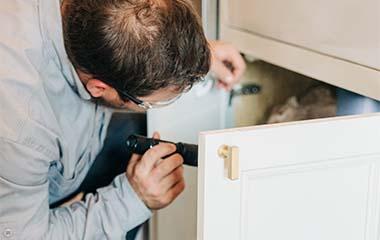
Termite Identification & Prevention
What are termites?
Though small in size and rarely seen by people, termites are a pest that all Alabama homeowners should fear and cause billions of dollars in structural damages across the U.S. every year. Termites are unique organisms because they can feed on cellulose and convert it to a usable source of energy. A single, mature termite colony may have hundreds of thousands or even millions of members. Though individual termites may be small, the damage they can cause together can be catastrophic!
The subterranean termite is the most widespread species of termites living in the United States. These termites nest under the ground and divide their colony members into different castes (groups). Worker termites feed and care for the colony. Reproductives (fertile females and males) are the only members able to breed and are also the only colony members with wings. Soldiers have large, strong jaws they use to protect the colony.
Are termites dangerous?
The biggest reason termites are so dangerous is that they can damage a structure “silently” and out of view. A termite colony works together like a well-oiled machine to gather food for its colony and can work for months or even years around the clock without alerting suspicion.
Once the damage is discovered, it can be expensive to repair, especially because most homeowners’ insurance doesn’t cover the cost of termite damage.
Example of the damage that termites cause include:
- Sagging, spongy floors
- Warped walls
- Blistered paint on walls
- Windows and doors which no longer open or close properly
- Brittle, hollowed pieces of structural wood
How can I prevent termites in the future?
To help stop termites from taking over your Alabama property, we want to offer some easy to execute pest prevention tips:
Reduce as much excess wood around your property as possible. Remove woodpiles, fallen trees, and tree stumps from your property.
If you have old, decaying fences, wooden furniture, or play structures on your property, remove or replace them.
If wooden structures in your home ever become damaged by water, immediately remove them and replace them with sound wood.
Help eliminate excess moisture in your home that attracts termites by using dehumidifiers and making sure to ventilate crawlspaces.
Repair any cracks or openings in your home’s foundation that termites could use as an entry point.
Get rid of wood-to-soil contact on or near your home.
Create a barrier at least 12-18 inches wide to keep soil or mulch from making contact with your foundation.


Hear From Our Happy Customers
Serving Auburn, AL Since 2020
-
"He was thorough and personable"Very professional and polite, he allowed me to ask questions and he explained every single thing he did to prevent pests during our initial visit.- Victoria M.
-
"This is a great company to work with"Prewett Pest Control did a great job for our church. They were immediately responsive, and all of their representatives were courteous, polite, and knowledgeable.- Rusty J.
-
"Justin was professional and courteous"He talked to me let know exactly what he was going to do.I am very happy with the results.- Hazel P.
-
"Enjoyed our first experience with this company"Richard came out and inspected our property and he did a phenomenal and thorough job making note of anything he saw that may cause potential issues and even offering suggestions.- Cher C.
-
"Would recommend. Justin Pearce is good at his job"Great Service and very good customer service. The best. A asset to the company. Very professional. Would recommend. Justin Pearce is good at his job.- William H.
-
"I wholeheartedly recommend Prewett Pest Control"Stan from Prewett Pest Control recently provided me with another outstanding quarterly pest control service at my property.- Mazzi A.
-
"Prewitt identified and closed the attic entrances in no time"
Big shout out to the Prewett Pest Control crew serving the Auburn area (Justin, Matthew and Ryan).
- Stanley S. -
"We are glad to have them as our year-round pest control"The Prewett team is great! Stan was friendly and knowledgeable! He answered all of my questions with ease.- Melissa F.







